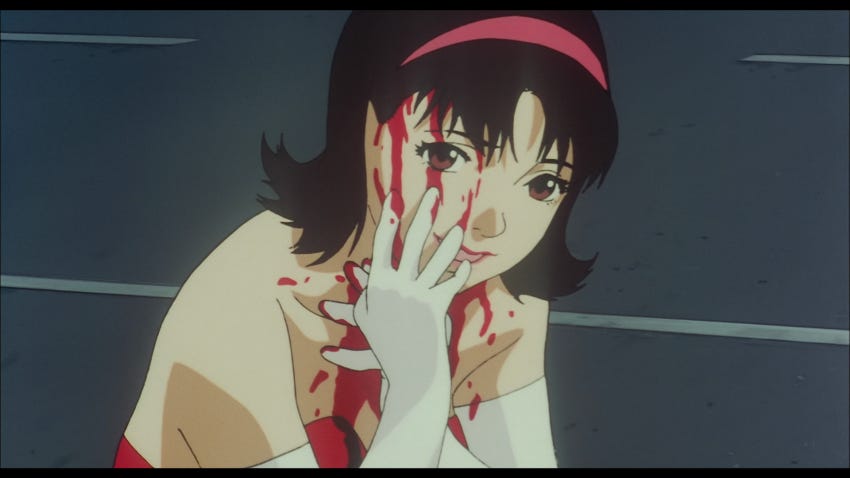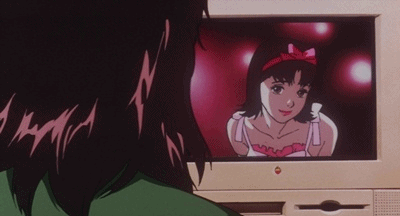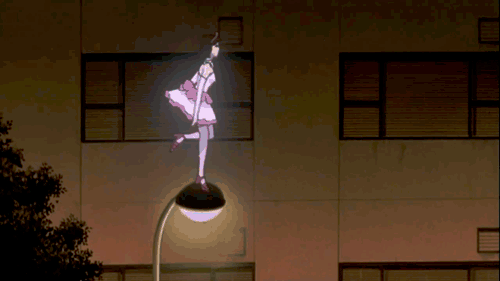Happy (belated) Halloween!
I don’t care for horror as a genre and never really liked indulging in violent things (besides the Higurashi series, which is incredibly violent), but I enjoy thrillers from time to time because they feel intellectually engaging.
Satoshi Kon’s Perfect Blue is a cinematic masterpiece that’s been replicated countless times. It is said to have provided some storyline inspiration for Natalie Portman’s Black Swan, shot-for-shot homages in Requiem for a Dream, and allegedly influenced HBO’s The Idol. For those who haven’t seen it, the film is the perfect primer for showing how animation can be intellectually stimulating and made for adults. This is a crucial point, considering most anime exported out of Japan is explicitly created for little boys, which has led many to associate the medium with art made for little boys.
Perfect Blue follows Mima, a J-pop idol who leaves her moderately successful group to pursue acting. This career pivot was typical for idols in the 1990s. To firmly separate herself from her idol image, Mima takes on a role in a television show that includes a graphic assault scene in a strip club. This bold career choice allows her to pivot away from her “idol” image, but it enrages her disfigured superfan, Me-Mania, and unsettles her manager, Rumi.
The film unfolds in a dream-like state where the viewer can’t distinguish reality from Mima’s psychological distortions from her acting roles. Kon was one of the first filmmakers to use the now-familiar technique where a character delivers a line and then, cut, you realize it was just a scene within a scene. It’s a masterpiece.
Why an Idol, Specifically?
I previously worked as an idol in Japan and have been immersed in the culture for nearly 20 years as a fan.
Before we discuss this further, I should also state that Perfect Blue originated as an extremely violent thriller novel by Yoshikazu Takeuchi. So Mima was already an idol in the source material, but Satoshi Kon decided to do something intelligent with his interpretation of the story when he made it a film.
Much of Kon’s work is Jungian in nature, with Paprika being another example. So the idol wasn’t just a convenient plot device(or because it was previously a book) it’s culturally essential to understanding the film’s psychological mechanics.
In Japanese society, the idol exists as a blank, feminine slate for men to project fantasies onto in prosperous post-war Japan. What few Westerners appreciate is how rapidly Japanese society transformed after WWII. By the mid-1980s, the Equal Opportunity Employment Act was passed, making workplace discrimination against women legally unacceptable. This created social anxiety among men who had been coddled by doting mothers and emasculated by wartime defeat…men now confronted with women’s rising power.
In Perfect Blue, Mima is a former idol who aspires to be an actress and transforms her public perception through a graphically violent sex scene. The film demonstrates that this is a harrowing event for her, but more so, it is psychologically altering for those around her who viewed her as an idol.
In the West, much has been written about idols being marketed as pseudo-girlfriends, but less has been noted in Western analysis about idols being viewed as someone fans live through. Her fan and another character (no spoilers) take on Mima’s identity because they’ve already internalized her as an extension of themselves.
Rather than “my favorite celebrity did a sex scene,” Me-Mania’s violent reaction stems from how she’s marketed: as a projection of her fans. When Mima takes agency over her body, it becomes, by extension, an assault on their body and soul. The idol isn’t just an object of desire, she is a vessel for their vicarious, feminine, living.
In the film we’re shown a few scenes where Mima is stalked by her body double, an idealized version of her that is still an idol. She’s literally being haunted by the projection others have created. Kon dramatizes the trauma of breaking from societal expectations by making the idealized version of Mima a tangible presence, amplifying the film’s exploration of fractured identity and psychological breakdown. The visual medium for this is beautifully done, and I can’t imagine it taking off outside of anime.
By setting Perfect Blue within idol culture, Kon holds a mirror to the nature of toxic voyeurism, and the idol framework made the horror personal, psychological, and devastatingly real.
If Perfect Blue were made in America, what media figure do you think would represent this story instead of an idol?






The obvious answer is a Disney channel star - some kid whose grown up like countless before them as the teen idol/actress now trying to burst out of that bubble like Miley Cyrus did ~20 years ago.
Gods, do I love Perfect Blue.
This is a brilliant analysis. I see... she will never be able to escape the image fans have of her; nor the self others feel they own. That is deeply traumatising. Honestly I think of One Direction, Justin Bieber- all the ones exposed from their youth